#vna novels
Text
I got stuck halfway through Cat's Cradle because Warhead was so grim and unpleasant. Eventually it occurred to me that I could just...skip it. So I read Witchmark this evening, and that was much more enjoyable! No longer stuck, ready to read more VNAs!
Best description of TARDIS materialization -> "Its mathematical anchors pulling free of the nexus point, the TARDIS threw an algebraic lifeline into the vortex. It looped wildly and then caught. As the equations hardened into reality, the real world interface was inserted into a new locale."
And this bit!!! -> "The Doctor ran his fingers lightly over the console of his restored TARDIS. The TARDIS ran her console over the fingers of her restored Doctor." AAAAAAAH my adorable little eldritch soulmate creatures!
4 notes
·
View notes
Text
this has been bothering me literally since flux. why did kate stewart say “this has been many lifetimes’ work for me and my family”? alistair and kate, that’s two, that’s two lifetimes. what was that about???
#options: she knows the future history of unit as seen in the vnas which includes more of their family.#this is a reference to how in the novels the brig keeps getting youthened.#we are meant to understand that their ancestors were involved in some kind of proto-unit even though we've seen one of them and he wasn't.#or something else???#doctor who#kate stewart#doctor who flux
72 notes
·
View notes
Text
The Timewyrm is one of the best Wilderness Years characters simply because artists drew her in so many different ways:

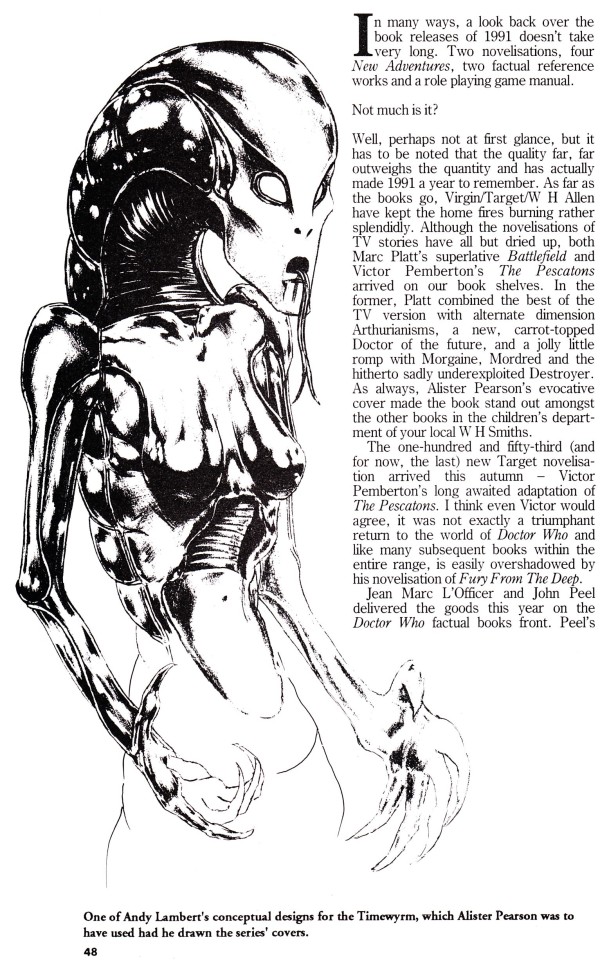


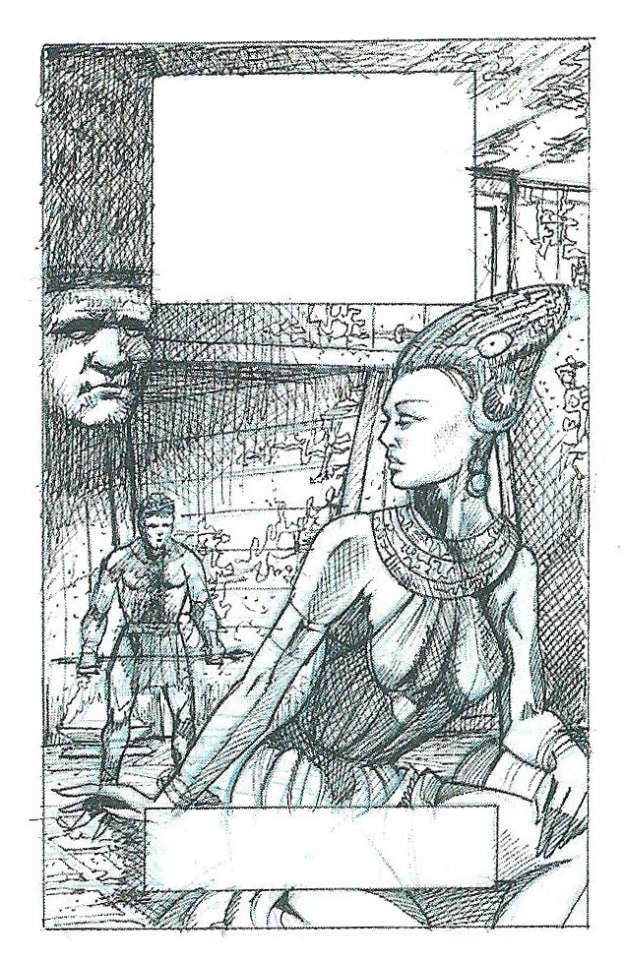

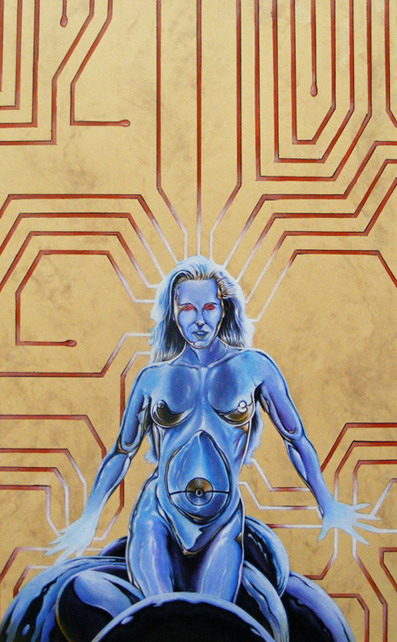


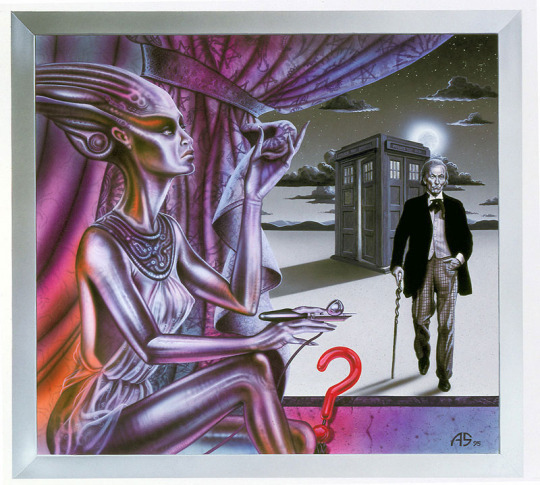

Concept art (DWM 167)
Concept art (Andy Lambert, DWM 182)
Concept art (Andy Lambert, DWM 305)
The New Adventures Prologue (Paul Vyse, DWM 175)
Timewyrm: Genesys (Andrew Skilleter)
Fanart by Paul Cooke
Blacklight: The Art of Andrew Skilleter
The Last Word (Lee Sullivan)
#doctor who#7th doctor#seventh doctor#virgin new adventures#VNAs#timewyrm#doctor who books#dw books#doctor who novels
34 notes
·
View notes
Text
hey if i wanted to get into the eighth doctor novels where would i start?
#doctor who#eighth doctor#dr who#the doctor#dw#i know the vnas and the edas are the two big novel series from the wilderness years but like. where od i start#asking for a friend (lie)#(asking for me)
40 notes
·
View notes
Text
HOLY SHIT!!! Big Finish has resurrected their Novel Adaptations Range after SEVEN YEARS; They're adapting the first Virgin Missing Adventure novel "Goth Opera"! If you're a fan of the Wilderness Years books or of the 5, Nyssa, and Tegan TARDIS team you should check it it out! It's releasing in July and you can preorder it now, LINKS BELOW!
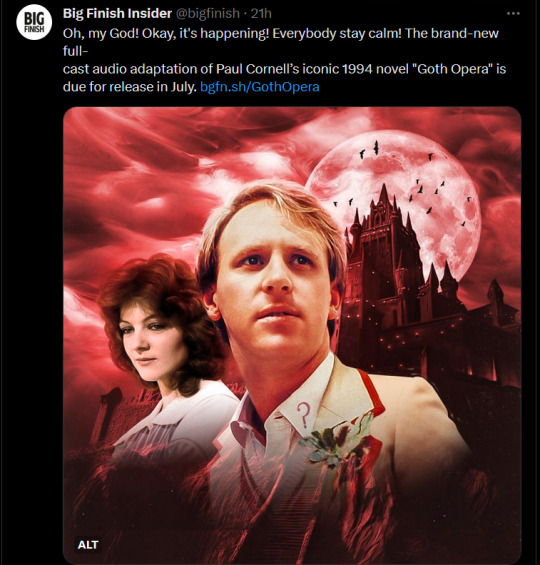
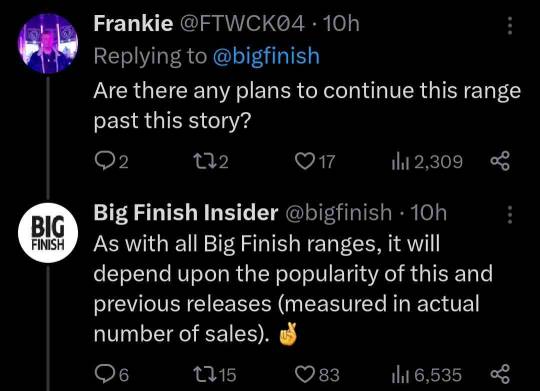
The VNAs and EDAs are a pretty niche corner of Doctor Who fandom these days so its really fucking cool to get more love for these stories and this era of the series (although they haven't adapted any BBC books yet). It'd be REALLY sad if they retired book adaptations because of meh sales so if you're even remotely interested feel free to check out the links below! THE CONTINUATION OF THIS RANGE GETS US ONE STEP CLOSER TO EIGHTH DOCTOR BOOK ADAPTATIONS. I NEED FITZ AND EIGHT YOU GUYS.
Link to Goth Opera page: https://www.bigfinish.com/releases/v/doctor-who-goth-opera-2998
Link to previous Novel Adaptations: https://www.bigfinish.com/ranges/v/doctor-who---novel-adaptations
#doctor who#dweu#doctor who expanded universe#nyssa#virgin missing adventures#tegan jovanka#5th doctor#peter davison#big finish#big finish productions#classic doctor who#virgin new adventures#bernice summerfield
235 notes
·
View notes
Text
On Gallifreyan Vestigial Gender
[this is the revised and expanded version of some rambling i initially did in my cowriter's discord DMs. i tried cite sources where i could, but a lot of this has been marinating in my brain since half-absorbing posts twenty pages deep into peoples' dw tags 3 years ago, and also i spend way too much time on the wiki, so please excuse anything i can't quite source, which is most of it. huge thanks to @oriigami for being my original conversation partner and contributing extremely to the concepts here, and to @bird-of-paradox and @waywren, neither of whom I am being allowed to @, for bothering me into not leaving it as unreadable discord screenshots]
-
There's this tendency among queer Doctor Who fans to look at Time Lord society, with its alienness and regeneration, and ask, frustrated, "Why do they even have gender?"
I sympathize with this extremely. I've been the one asking this question plenty in the past, and I do think it's a bit silly, and even sillier that the genders are "man" and "woman" and there are apparently two of them. But I also think that the section of canon most insistent about the Gallifreyan gender binary, the 7th Doctor novels from the 90s, also has the potential to be the most interesting about it.
Now, this is not to say that the text of those novels isn't weird about gender in a flawed, written by (as far as I know) cis people in the 90s way. But I think that you can extrapolate and queer what's there in very interesting ways, often because it's so flawed in the first place: Gallifrey, too, is an extremely flawed society. Decadent, degenerate, and rotten to the core, as the show put it.
So, VNAs Gallifrey: living Houses and their female Housekeepers, cultural and literal planet-wide sterility, Loom birth, rigid overcomplicated bureaucracy, the enduring legacy of the pre-Rassilon Pythian regime. The gender binary as presented here goes something like
women: chaos/magic/psychic powers/superstition/the house (scary)/biological childbirth/fertility
men: cold rationality/order/science/bureaucracy/loom-birth/sterility
The Pythia and the Lord President. Magic and science. The House and the Web of Time.
Obviously a lot of this is classic gender binary stuff. But let's put the exasperated question of "Why must we do the gender binary like this?" aside for a moment and think about Gallifreyan society instead.
Pythia-ruled and Time Lord-ruled Gallifrey have a lot of the same problems in the end, just wearing different faces: they're both very much totalitarian states that believe themselves to be above everyone else. But while the Time Lords observe and micromanage the Web of Time from their Panopticon, maintaining its integrity to their standards, the Pythians didn't have time travel, so this preoccupation with control manifested--as far as I know; this is the bit in the meta where I admit I haven't actually read Time's Crucible yet--as keeping the entirety of society in one psychic hivemind, leaving nobody any privacy, plus a lot of future-reading and prophecy and whatnot.
The main relics of that societal layout into post-Rassilon Gallifreyan society are the Matrix, which has every single dead Time Lord's brain in it and does their prophecies for them, just couched in a little bit more science than Pythian magic, the Houses, which are alive all around you and in which you're constantly being watched by the Housekeeper through her mirrors, and, of course, the gender binary.
The Pythia was always a woman. Women were the ones with vast psychic powers, with magic; women were the ones in charge. Pythian Gallifrey was a heavily gendered society. This is because Gallifreyans are a kind of bug /shot with the "irrelevant to the point at hand" gun.
And so, when Rassilon rebelled, he was very much playing the part of "opposite gender with opposite worldview." The Pythia had female magic and superstition; he had male science and technology. His most trusted Founders were either all or mostly men, depending on the version of events you prefer. (Personally I have my doubts about the Other.) Rassilon built his new society as a man, among men, in opposition to the matriarchs before him.
Gallifrey, despite the invention (or theft, depending on the story) of regeneration allowing people to trans their gender randomly and sometimes unintentionally, never left the gender binary behind.
The whole point of modern Gallifreyan society is that they're still stuck in that exact same moment Rassilon took over (and the Pythia cursed them to sterility, if thats the version you're going with). You could easily make an argument for this being some cycle of abuse type situation; Rassilon and co overthrew the Pythia and immediately did exactly what she was doing to them to the wider universe. I tend to read it as a regeneration: it's the same society, really. It just died and was reborn, and now it looks and sounds different.
-
The downside of trying to translate a discord conversation into a proper meta post is that sometimes making a coherent transition between thoughts is impossible. So to introduce the next bit of this post, I'm going to hand you off for a moment to this post about the 8th Doctor's "I'm not sure I've ever even been a man" quote from Interference. As op of that post says, the Doctor is genderqueer even by Gallifreyan standards- he's being questioned in that scene by another Gallifreyan, who doesn't understand his experience of gender.
The EDAs are full of "Eight is nonbinary" quotes, of course. Every queer fan who's ever engaged with them has a collection (and if anyone knows where that one google doc compilation that was going around awhile back went I'd be in your debt, because I'd love to know if my collection is missing any), but almost all those quotes refer to his genderqueerness in human terms, as observed by human companions, or in response to human assumptions. Except that one. Not only is Gallifrey's gender binary alive and well in a society where people can literally change their gender when they die, but the Doctor doesn't fit inside it.
All this to say that being a renegade Time Lord is a nonbinary thing to do. Especially the Doctor, with all sorts of weird Other Timeless nonsense in their biodata. Women stay on Gallifrey (or Karn!) and do magic and watch you. Men stay on Gallifrey and do science and watch other people. Renegades go out and do whatever they please. But I'm getting ahead of myself.
-
So. Gallifrey has a gender binary. It's vestigial, a remnant of an earlier iteration of society with a much sharper male-female divide, and it doesn't make logical sense for it to exist. So: How does it manifest? And what function does its continued existence serve in the interests of the status quo and ruling class?
Let's take a look at 7th Doctor novel Lungbarrow.
Lungbarrow introduces us to (among many other things) the living Houses of the Time Lord Families, and to the family structures within: the patriarchal figure of the Kithriarch, the always-female Housekeeper, bound in her ritual marriage to the House itself, and hordes of petty squabbling Cousins.
Kithriarch is already an interesting title. It's obviously a gender neutral version of matriarch or patriarch, but the role itself seems to be almost entirely a male sort of thing in opposition to the feminine Housekeeper.
The Housekeeper, meanwhile, seems to be in a direct conceptual and societal line of descent from the Pythian priestesses: she can see anything within her domain, she has a psychic connection to the House, from whom she cannot hide anything, she can command the wooden Drudge servants and other House subsystems, she prioritizes the House above all where the Kithriarch is supposed to prioritize the Family. Women are frightening and powerful psychics. They know everything you want to keep secret, and prioritize the collective.
(There's also something here about how Lungbarrow presents duelling dualities--the Doctor and the Master, the CIA head and the Lord President, the Kithriarch and the Housekeeper, the masculine and the feminine--but I haven't quite tied it into the rest of this yet.) (Although while we're mentioning the Master. He's girlcoded by Gallifreyan standards and the Rani is boycoded by the same. I will not be expanding on this at this time just trust me.)
I think Housekeepers and women who want to be Housekeepers try to keep their self-image as women strong enough that they never regenerate into a male body (whatever a '"male body" means, of course, but I'm not sure Time Lords have gotten that far in their queer theory yet). I also think that there are more female Kithriarchs than male Housekeepers, because Housekeeper is much more heavily ritualized role in keeping with the Pythia's more ritualized general vibe, but I do think female Kithriarchs are still few and far between.
I also think that these are probably the most explicitly gendered occupations on Gallifrey, although of course you'll see some drift. Most women are out there getting the same scientific, military, and bureaucratic positions as men. But there's this lingering specter of gender roles, a Pythia-shaped hole that exists around the concept of womanhood. As my cowriter put it when we were talking about this, an "ideal of womanhood. not ‘ideal’ as in desirable, [but] ‘ideal’ as in the quintessential image of the thing."
This is further amplified by the continued existence of the Pythians in the form of the Sisterhood of Karn, living in their perfectly functional all-women magic society just out of sight. Their presence at the edge of the Gallifreyan consciousness must haunt the Time Lords, as any imperialist power is haunted by its own past and its own ultimate impotence.
Because that's the other thing. Gender roles are, to quote my cowriter again, "stupid and antiquated and historically potent tools of authoritarianism." Of course the Time Lords have them. Have you seen them?
They're tools of control, of conformity, of idealizing the past. Of conservatism. Consider, to once more quote my cowriter, "the weird traditionalist psychosis of having gender roles in a society that can’t bear children."
The ideal woman on Gallifrey is still the Pythia, millenia or even billenia on. And the ideal man is still the Lord President Rassilon.
-
[thank you for your time! if you liked this please consider checking out my fic Something Old, which is about lungbarrow, the adventuress of henrietta street, and the gallifreyan concept of marriage, and in the writing of which i initially articulated most of the thoughts in this post. i've previously characterized it as a fic that's actually a meta post. and please don't be too mean to me for anything i got wrong in here! i'm just a little guy]
#zephflix original#meta tag#doctor who#gallifrey#gender stuff#a house isnt a home without invasive psychic contact -gallifreyan proverb i just made up#also i bet the shobogans have great whatever the gallifreyan equivalent of gay bars are
62 notes
·
View notes
Text
Just started reading Where Angels Fear (Virgin New Adventures) and it is very good so far. It does have a bit to much fan service but at least is sexualises the men just as much as women. I have already read the next two books in the Dellah Gods arc (the Mary Sue-Extrusion and Dead Romance) honestly I think more people should read the Dellah Gods arc from the VNA’s when ever anyone mentions them it always feels like they are brought up only as a foot note to Dead Romance, in my opinion it is a very interesting narrative, I do myself need to find the last four books to say my complete thoughts on it but none the less I feel the rest of the books in the arc should be appreciated as well. It is an interesting Theatre of the War in Heaven the arc almost feels like a predecessor to the Faction Paradox spin off even beyond the dead Romance Connection the link to war is seen in Where Angels Fear when Brax is refuses to return to his Homeworld to help fright/prepare for some Great War against an unknown Enemy. When people talk about the novels connected to Faction Paradox they mention the EDA’s and Dead Romance they may even mention Christmas on a Rational Planet and Lungbarrow and even more rarely the the Adventures of the Diogenes Damsel and Miranda, but they never mention the rest of the Dellah Gods arc or the Dinedum War Arc from the audios both of which are very interesting theatres of the War in Heaven and the Dellah Gods arc I think should be reevaluated beyond the arc which gave us dead romance and be seen in it entirety and respect as a whole not just one part of (an admittedly very good part) but each novel I think people should go back and have a look at. They all play a role. Heck I don’t even see much mention of the Arc even in Bernice Summerfield fan areas. The arc sets up not just big finish’s Bernice Summerfield range but also sets up and sets a precedent for what will become Faction Paradox. So here is my recommendation whilst you can read Dead Romance on it’s own give the other six books a chance.
Where Angels Fear
The Mary-Sue Extrusion
Dead Romance
Tears of the Oracle
Return to the Fractured Planet
The Joy Device
Twilight of the Gods
And whilst your at it why not give the rest of the Post-Dying Days era VNA’s a look they are just as worthy as the pre Dying Days VNA’s and the EDA’s of your praise. I just feel sometimes that people forget about them beyond vaguely mention that before big finish got them their was a series of 27 books and Dead Romance was a VNA before it was a Faction Paradox story.
28 notes
·
View notes
Note
Hi <3 No obligation to answer, I know dw lore is really convoluted and there's a lot of expanded universe material, but you've mentioned a few times that you think the War Chief is the Master. I'm also a War Chief/Master truther because I think that makes the contents of The War Games more fun and interesting (& also could count as another time the Master got the Doctor killed <3 romance <3) but I wanted to know if you had more reasons/examples from canon that supports that idea
anon i’d be delighted to talk abt the war chief!!! he’s My Guy <3 and (dare i say it?) possibly even one of my favorite incarnations of the master. i’ve got lots of quotes for you under the cut, but to give a short summary of So Why Do People Think the War Chief is the Master, Anyway?:
the war chief was introduced in the war games, written by malcolm hulke and terrance dicks. (dicks, it should be mentioned, was also co-creator of the master, with barry letts.) when hulke & dicks novelized the serials colony in space, terror of the autons, and the war games, they dropped several hints that the war chief and the master were the same man. so, the creators of the characters were the first to suggest a connection between them.
but, i hear you cry, didn’t dicks go on to write timewyrm: exodus, which shows us a future incarnation of the war chief that isn’t the master? yes, because the official editorial line for the vmas & vnas was that the war chief & the master were two distinct characters. this caused more than one writer that personally believed them to be the same to write otherwise professionally. however, i think dicks still dropped hints linking the two despite this editorial limitation.
and what about magnus, the guy who’s well-known in current fandom as the “academy era” version of the war chief? conceived of by gary russell, magnus was originally written as a young incarnation of the master, not the war chief. in flashback, goth opera and invasion of the cat-people, the character of magnus is a young master. so why did russell retcon his own character in divided loyalties to be the war chief instead? he did so out of respect for david mcintee, who had recently written a different backstory for the master in the dark path, using the name koschei. despite divided loyalties’ portrayal of magnus and koschei as separate characters, it actually in large part serves to conflate the two further, due to said retconning.
in faction paradox lore, the war king is a version of the master (i don’t need to make a post on that, do i?) that also was once the war chief.
and now we’re really getting murky canon-wise, but craig hinton’s rejected pda time’s champion (ultimately completed & published after his death, by chris mckeon) explicitly depicts the war chief as an incarnation as the master, as well as reasserting that magnus was the name the master used at the academy.
even with all this Evidence, i’m like you, anon — i just think it’s Fun. i mean, just look at the guy lmao. if you can’t see the way that future incarnations are riffing off him, idk what to tell you. and ultimately, it just makes the most sense to me. three & delgado’s first meeting doesn’t really strike me as a First Time Seeing You Since You Left kind of affair, but the way two & the war chief react to seeing each other? and the conversation they have abt it…? yeah. love it.
the ‘70s target novelizations
doctor who and the doomsday weapon (aka colony in space) was the first novelization to feature the master, and was written by malcolm hulke in 1974. it begins with a scene that doesn’t occur in the tv story, where a senile old time lord tells his apprentice about the theft of two tardises by a pair of time lords now calling themselves the doctor & the master:
“There have been two stolen, you know.”
The younger Time Lord didn’t know. “By our enemies?” he asked.
“No. By Time Lords. They both became bored with this place. It was too peaceful for them, not enough happening.” The old Keeper smiled to himself, as though remembering with some glee all the fuss when two TARDISes were stolen. “One of them nowadays calls himself ‘the Doctor.’ The other says he is ‘the Master.’”
if there have been only two tardises stolen (at this point), then where does that leave the other renegades we've seen on tv? well, the answer to that is that the target novelizations were meant to be self-contained, without prior knowledge of the show needed or past episodes taken into account. it’s easier and cleaner to present the doctor & the master as the only two renegades. except the older time lord continues, and a little further on says:
“There were tens of thousands of humans from the planet Earth, stranded on another planet where they thought they were re-fighting all the wars of Earth’s terrible history. The Doctor” — he interrupted himself — “I told you about him, didn’t I?”
“Yes,” said the young Time Lord, now used to the old Keeper forgetting what he had already said. “You mentioned the Doctor and the Master.”
“No, it wasn’t the Master,” said the old Keeper in his confused way. “The Master never does anything good for anyone. He’s thoroughly evil. Now what was I saying?”
despite the self-contained nature of the novelizations, the events of the war games (which had yet to be novelized, when this was written) have occurred and are specifically brought up in relation to the doctor & the master. what does ‘it wasn't the master’ mean? the keeper’s confusion leaves it open to interpretation, but the fact that it’s brought up at all is quite a hint.
terrance dicks then wrote doctor who and the terror of the autons in 1975. additional info is added to the scene between the doctor and the time lord who comes to warn him about the master’s arrival on earth:
“As a matter of fact, I’ve come to bring you a warning. An old friend of yours has arrived on Earth.”
“One of our people? Who is it?”
The Time Lord pronounced a string of mellifluous syllables — one of the strange Time Lord names that are never disclosed to outsiders. Then he added, “These days he calls himself the Master.”
he uses the master’s gallifreyan name first, as if the doctor doesn’t know the name he’s now going by yet. then, we’re given a description of the master, including:
Already he had been behind several Interplanetary Wars, always disappearing from the scene before he could be caught. If ever he were caught, his fate would be far worse than the Doctor’s exile. Once captured by the Time Lords, the Master’s life-stream would be thrown into reverse. Not only would he no longer exist, he would never have existed. It was the severest punishment in the Time Lords’ power.
which brings to mind the war games, as the punishment described here is exactly what the time lords did to the war lord & what they would have done to the war chief, if he hadn’t died/escaped. and, speaking of that escape, the doctor asks:
“Is his TARDIS still working?”
“I’m afraid so. He got away before it could be de-energised.”
“Then he was luckier than I,” said the Doctor sadly. He had never really got used to his exile.
unlike the doctor, who was unable to get away from the time lords at the end of the war games, the master was ‘luckier.’ this could, of course, mean a more general escape from the time lords by the master, but i’d say all the hints here are pointing in the same direction.
in 1979, malcolm hulke wrote doctor who and the war games. the first conversation between the doctor and the war chief is slightly changed, and again it’s reiterated that there have only been two tardises stolen. first, the war chief teases the doctor about who he must be:
The War Chief took the Doctor into his private office just off the war room and told his bodyguards to leave.
“Now,” he said, “a traveller in a time-space machine. There is only one person you can be.”
“I had every right to leave,” said the Doctor.
“And to steal a TARDIS?” The War Chief smiled. “Not that I am criticising you. I left our people too. We are two of a kind.”
and later, he summarizes that their empire (their empire <3) will be secure because, again, they’re the only two with stolen tardises:
“Now I understand,” said the Doctor. “It’s my TARDIS that you want. But surely you have one of your own?”
The War Chief smiled. “No more mine than yours is really yours! We are both thieves, Doctor. Yes, I do have a TARDIS hidden away. But are not two better than one? While I rest and enjoy the spoils of victory, you can patrol our empire. And I shall do the same for you.”
“Our empire?”
“We shall rule the galaxy without fear of opposition,’ the War Chief said confidently. “For we shall be the only two who can travel through both space and time.”
this (very romantic imo) proposal is also, of course, very reminiscent of delgado’s ‘half-share in the universe’ proposal to three.
timewyrm: exodus by terrance dicks
in 1991, terrance dicks wrote a vna, timewyrm: exodus. in this novel, the war chief appears as a botched two-bodied regeneration after his death at the end of the war games, called dr. kriegslieter. no mention of the master is made. as i said before, i think this is down to virgin’s editorial policy, and i think there are hints connecting the two nonetheless. like when the doctor realizes who kriegslieter is:
And behind them, aiding them, manipulating them, giving them the time technology they needed, the Time Lord renegade who called himself the War Chief.
Or, in German, der kriegslieter.
“Well, he couldn’t have spelled it out for me much more plainly,” muttered the Doctor.
like, c’mon. it’s just classic master shenanigans to have your alias be an extremely obvious translation of your name. and then there's also kriegslieter’s plan, which is to steal the doctor's body to use as his own (complete with sexual innuendo):
“Once I have wrested from it the secret of the TARDIS, your mind will be of no further interest to me. But your body…”
“Please,” said the Doctor, looking embarrassed. “Ladies present.”
“We are both Time Lords, Doctor, our brains and our bodies are compatible. Regeneration therapy is far beyond the War Lord’s scientists, but even they can manage a simple brain transplant.”
Kriegslieter studied the Doctor with detached, clinical interest. “To be honest, it isn’t the body I would have chosen but it’s infinitely superior to the one I have. When all this is over Doctor, I shall be you — and you, or whatever shattered gibbering remnant of you is left, will be me. Appropriate, don’t you think? A crippled mind in a crippled body…”
how many times have we seen the master do that? maybe only once when this book was written (in the keeper of traken, of course) but at least three more times since then, by my count. in addition ‘we are both time lords’ is an echo of both two & the war chief's conversation and three & delgado’s (in the mind of evil, the claws of axos, and colony in space).
kriegslieter also calls seven ‘my dear doctor’ throughout, which is not a quirk of speech that the war chief has been ever shown to have. i can't claim it's unique to the master, but i think there's a certain history there. (did you know ainley says it five times in one 50 min long serial?)
magnus, as the master
as said before, the character of magnus was introduced in comic flashback, which appeared in the doctor who magazine winter special for 1992 and was commissioned and edited by gary russell (& written by warwick gray). it depicts seven and benny viewing a scene from the doctor’s past, where two old friends, thete and magnus, are at odds.
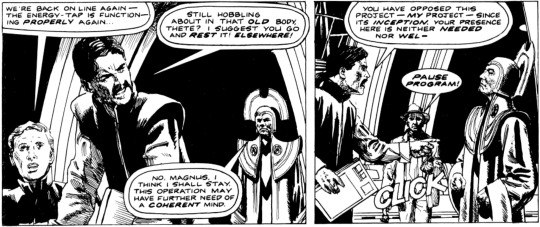

magnus was, at the time of this comic's creation, meant to be the master. there is no connection to the war chief in this story. which is why when goth opera, written by paul cornell, is published in 1994, magnus is the name used for the young master when listing out the doctor's school friends:
“That was when I was young and wild, Doctor. My contemporaries and I grew up to take our responsibilities seriously.”
“Ah…” The Doctor nodded. “Unlike my year. I begin to see.”
“Yes.” Ruath warmed to her subject, sipping from the goblet. Her eyes never left the Doctor’s. “Mortimus, the Rani, that idiot Magnus. And you, Doctor. All graduates of Borusa’s Academy for scoundrels.”
and, in 1995, when gary russell wrote invasion of the cat-people, he again used magnus as a name for the young master, referencing the master running out of lives far more quickly than the doctor by the time of the deadly assassin:
Polly smiled. “I’m glad you’re completely recovered, Doctor. You had us worried, you know.”
“Regeneration’s a tricky thing,” he said. “And it was my first one. Always the trickiest. They’re supposed to get better as they go on, so long as you don’t flitter them. Always used to say to my academy chum Magnus, ‘Magnus,’ I’d say, ‘Magnus, don’t throw old bodies away like you would a suit. They don’t grow on trees.’ Or something like that. Never listened though.”
when gary russell wrote divided loyalties in 1999, he followed mcintee’s lead in using koschei as the name for a young master, and instead retconned magnus a younger war chief, showing the two of them interacting during the doctor’s academy days — the final nail in the coffin of our lil theory, right? well, all i’m going to say to that is that all the academy era stuff we see is actually a nightmare the fifth doctor is having. so who’s to say he didn't dream his best friend as two different people? (he forgot which one of them killed a guy with a rock, after all...)
the war chief king
in the book of the war, the 2002 faction paradox ‘encyclopedia’ edited by lawrence miles, the entry on the war king states:
His personal assistant notes that his office is brimming with official business, but devoid of decoration. The only concession he makes to sentimentality are the components of a hypercube, twelve white squares stacked neatly on his desk. Its significance is unclear, but it’s thought to be the War King’s last remaining link with his unfortunate past.
the very first use of a hypercube was, of course, at the end of the war games, when the second doctor called the time lords in. if that's not concrete enough for you, the war king spells it out even more clearly in the 2021 audio sabbath and the king:
THE WAR KING: I have failed to introduce myself. I am— ah, but as we have just seen: names have power. I do not think I shall grace you with one of my true names, Sabbath, no, not yet. Let’s see. The Deathless? Oh, let us not get ahead of ourselves just yet. Chief and Master, Minister and Magistrate, President and King… I have been many things.
time’s champion
and finally we have time’s champion, originally written in the '80s(?) by craig hinton, completed and published by chris mckeon in 2008. first, we have mel stumbling upon a corridor of portraits in the tardis:
Her first impression was that the Doctor was at the end of a long, thin corridor. And then she realised what the corridor was. An art gallery, the length hung with paintings, from the doorway to the far distance.
As she started padding silently along the corridor, she looked at the paintings, and saw they were all portraits. Portraits painted in a variety of styles, from photo-realistic to impressionist, and everything in between. And she recognised some of the subjects.
[…]
Moving on, Mel had hoped for something a little less depressing, but it wasn’t to be. The atmosphere had changed again: it was still cold, but a sterile light was now bathing the area. Then she realised why: the sterility, the coldness — trademarks of the Time Lords. This must be the Doctor’s own people.
Pride of place was given to the Master — or rather the Masters: the familiar, music-hall villain in his velvet penguin suit had been captured in all his melodramatic glory, but there was also a suave, older man, his eyes radiating a fierce, evil intelligence wrapped in charm, next to which was positioned the portrait of a young, satanically handsome man with long, sharp sideburns and a thin, beard-length moustache, whose hand vainly clutched at a strange medallion hanging around his neck, as if clinging to the only power in his possession. And then there was an image of the cadaver, that rotting corpse that Mel knew was all that remained of the Doctor’s oldest friend and oldest enemy, animated by nothing but pure malice and spite.
the description of the ‘satanically handsome man’ is obviously the war chief. and then, the doctor remembers events from his past:
The night time vanished into the shadows of light, as new images, all familiar, threw themselves past the Doctor’s eyes: his tedious years at the Academy, his rise in the Time Lord hierarchy, his flight from Gallifrey, the early years of his exile, the planet of the War Games and his reunion with the Master, the lost years of imposed servitude to the Time Lords, all his memories and so many more impressed their way across the Doctor’s vision, even up to the moment of the present day. Then, abruptly, the vision ended. The Keeper began to speak again.
his reunion with the master occurs during the war games and precedes his exile (which is when his meeting with delgado’s master occurs). and magnus is once again used as a name for the young master:
The Doctor and Benton managed to glimpse him as he raced past. He was young, with a curving moustache and a dark, haughty face accustomed to obedience but now shadowed and twisted by fear. He ran onwards without even pausing to acknowledge their presence. He seemed desperate to outrun something. Moments later, a group of well-armed and uniformed men rounded the corridor and also hurried past the Doctor’s party, following the fleeing man in their wake.
Steadying himself against the cool stone wall at his side, the Doctor watched the squad pass, recognising them as members of the Chancellery Guard, but clothed in armour and dress from the long departed era of his days in the Academy. The Doctor paused, wondering where he had seen that face before.
“Magnus?” the Doctor whispered.
Benton stepped over to the Doctor.
“Who was that bloke those boys were chasing after, Doc? He looked a bit like the Master.”
The Doctor gazed into the distance.
“That he did, and for good reason.”
30 notes
·
View notes
Text
It's so weird when wilderness years stuff, but especially VNAs have a normal price. What the fuck do you mean "Original Sin" is like £10. The first Chris and Roz novel? That's the one that costs £10? Sure I'll buy it
19 notes
·
View notes
Text
The BBC Eighth Doctor Adventures "War in Heaven" arc, as it may have originally been
The BBC Eighth Doctor Adventures, at their start, didn't have any arc set-in-stone, and so author Lawrence Miles wrote the masterpiece Alien Bodies, kick-starting the "War in Heaven" arc. However, on 3 July 2000, The Ancestor Cell was published, putting an end to the War in Heaven arc, at least within the EDA range.
Before this novel was published, Lawrence Miles had other ideas for the War in Heaven, and I for this post have attempted to reconstruct a rough timeline for what could have been, from the available evidence. Bear in mind that I have taken some creative liberties and speculation. As there will be quite a few different stories in different ranges, some released and some unproduced, I've decided to code them for convenience: first off, assume everything is a published EDA unless told otherwise - then, green is for a part of the "Bernice Summerfield" New Adventures, blue is for Past Doctor Adventures, orange is for anything else, and bold is for unproduced (these can be combined).
Prelude
Down (September 1997)*: the Gods are introduced, setting up a War seemingly separate to the War in Heaven. This most likelywasn't originally intended to tie-in to the EDAs, or be part of the War in He and, but was brought in by Dead Romance.
Alien Bodies (November 1997): Faction Paradox, the Enemy, the Celestis, and the state of Gallifrey and it's cloneworlds during the War in Heaven is introduced and established as being in the Eighth Doctor's future.
Unnatural History (June 1999): small skirmish with Faction Paradox. It is altogether unclear whether they come from the War or from the Eighth Doctor's time
Act 1
Dead Romance (1 March 1999): the universe of the VNAs, that of Chris Cwej, is implied to be in a bottle in the EDA universe, as itself contains a bottle. Later stories would draw continuity with the VNAs, and The Ancestor Cell (not counted in this list) saw the merger of the bottle into the main universe. This is also implied to be the case by the fact that Cousin Eliza - Christine Summerfield - appears to be in the prime universe by The Faction Paradox Protocols. Personally, I reconcile these by concluding that only the later VNAs starring Bernice Summerfield, which lacked the BBC Doctor Who license, are part of this "bottle", and that Christine used the Gods of that universe to climb out of it, as she implies at the end of the novel.
Interference: What Happened On Earth (August 1999, part of "Interference"): a major interaction with the War; the Doctor prevents the destruction of Earth by wartime powers, thus marking his first major intervention in the War, as Earth is a cradle point of casualty. The War also infects the Doctor's timestream back to his third incarnation, in Interference: What Happened On Dust.
Toy Story (1999/2004)*2: Lolita talks to the TARDIS.
Interference: Foreman's World (August 1999, part of "Interference"): I.M. Foreman reveals the bottle universe, says the people within created their own bottle universe, and it is lost. This effectively confirms the implementation in Dead Romance. Interestingly, as far as I know, most people read Interference first, completely missing the fact that the ending of it is meant to confirm Dead Romance, not foreshadow it. At least, I completely missed that.
Beneath the Planet of the Spiders (after "Interference"): The Fourth Doctor combats the Eight Legs in place of the Third Doctor, and presumably the effects of Interference are further explored.
Valentine's Day (after "Interference"): the Doctor exiles himself for fear of regenerating into something worse than Faction Paradox could imagine. With his absence, the Daleks rise to power. The Doctor then trains a replacement, with the combined help of the Time Lords and Faction Paradox. Ideas of a replacement were adapted by Miles into The Adventuress of Henrietta Street, where the replacement is Sabbath Dei.
The Taking of Planet 5 (October 1999): Mictlan, realm of the Celestis, is destroyed, and the Doctor aids in saving the rest of the universe.
The Shadows of Avalon (2000): The specifics of Compassion's transformation into a TARDIS, and potentially the transformation in totality, were probably not part of Miles's original plan. However, he notably didn't contradict it in The Book of the War, so this will still be included.
Act 2
From here on out, there aren't any actual plans for Eighth Doctor novels, although that is likely just due to the small gap between Interference and The Ancestor Cell. Nevertheless, this has the interesting diegetic effect of making it seem that the War has started to escape the Eighth Doctor, and is widening it's girth.
First I shall list the unproduced novels that would fit into here, and then offer my diegetic summary:
The War (after 12 March 1999): Pertaining to an unknown range, perhaps the Past Doctor Adventures (as it also included the non-past Infinity Doctors and would have included the future Requiem), this would have featured Joanna Lumley's Thirteenth Doctor being in a concentration camp with other "strays from other realities", all taken from BBC sitcoms which the BBC still had rights to. @verityshush commissioned Wenart Gunardi to make a cover for this, in the style of the Virgin New Adventures (the anachronism fits)
Requiem (after 1998's "Interference"): There is a "huge, bone-like thing" in the sky over a war-paranoid Gallifrey. Miles contested that "The Ancestor Cell" copied the idea of this, but the thing in the huge black bone structure in Requiem reportedly was totally different to in "The Ancestor Cell".). There would have been 5 sequels to Requiem, all following this "future incarnation of the Doctor". Presumably these would have crossed over with the BBC Eighth Doctor Adventures at at least one point, if not more.
Below is my deigetic imaging of what could have been.
The War in Heaven expands beyond the Eighth Doctor's timestream, and begins infecting both alternative timelines (The War) and future incarnations (Requiem). The future incarnations may be an "infection" of the developing War, as the Doctor "originally died on Dronid", but as it's heavily implied that's not quite what happened, he could have easily experienced Requiem first and then gone back to the beginning of the War (which should be impossible, but just look at how many times the Eighth Doctor interacted with the future War) to be found on Drornid.
Despite expanding beyond the Eighth Doctor, it still chases him, or to be more specific, the War Queen Romana chases him, Fitz, and their timeship Compassion. Eventually, in unknown book (unknown because future novels with the War Queen Romana never even got to the pitching state, but feel like they should have existed), the Doctor would regain his TARDIS, and in my ideal world it would have regenerated (not because I don't like the Victorian parlour, quite the contrary, I the arc would be more impactful if it had a permanent effect). I think that after he gets his TARDIS back, the Eighth Doctor should just keep on as normal, not really seeing the War all that much, perhaps even his TARDIS has engineered itself to not ever collide with it again - without the Doctor's knowledge? - but there's no "cataclysmic", The Ancestor Cell -like removal of the War.
Compassion, now a timeship separate from the Doctor, Fitz, and the Doctor's TARDIS, would leave the "TARDIS team" and eventually get the companion "Carmen Yeh"*3
Finally, an unnecessary but nice note on how Compassion become the mother of timeships:
The Book of the War, specifically the entry on "Carmen Yeh", features Compassion confronting the War King, and entering into diplomatic relations with him. This is likely the intended point by Miles of when Compassion would have aided in the reproduction of the 103-forms, as opposed to The Shadows of Avalon's version (rape).
*I have not actually read this book, my info for it derives solely from Nate Bumber's blogspot about the Bernice Summerfield War
*2 This was first published in the charity anthology Perfect Timing 2, and then later reprinted in Mad Norwegian Press's edition of Dead Romance
*3 In the Perfect Timing short story "Schrödinger's Botanist", Carmen Yeh would meet Compassion and join her.
Tagging (with permission): @doctornolonger
#faction paradox#doctor who#eighth doctor adventures#the war in heaven#eighth doctor#lawrence miles#essay#a wartime paradox
47 notes
·
View notes
Text
Started the second Cat's Cradle novel and I don't like it so far. The setting is depressing and hopeless, and the Doctor seems to be leaning REALLY hard into the amoral unknowable goblin persona. Also what does any of this have to do with the first Cat's Cradle book? I assume that question will be answered eventually, but it's so jarringly different from the first book of the trilogy, it's bothering me.
2 notes
·
View notes
Text
you know the game of tardis team swaps? like how would ten and donna have done in genesis of the daleks, or whatever? I was thinking about it specifically for ace & hex / ace & benny.
I think benny would do ok in the hex audios, but they go to history a lot, and I think it would be very heavy for her. she wouldn’t be able to be slightly detached and self-possessed, there on her own terms, in the way she often is in the vnas
hex meanwhile would be extremely useful in the vnas. vna!seven is constantly playing stupid games with his own health as well as with everything else and hex would work up the nerve to call him out. hex would not be able to exist near a plan that involves taking a large quantity of LSD so you can get possessed more fully
#the left-handed hummingbird#btw#it did work! he got very possessed#(he needed to be able to track down the guy who was possessing him)#(it was… a plan!)#doctor who#seventh doctor#ace mcshane#hex schofield#bernice summerfield#big finish#doctor who novels#I love vna!seven more than I should. idk if it was objectively a good direction to take the character but#he is just maximum horrible little guy#he is so so skrunkly. scrongly even#Ace would understand this. if I said those words to her she would instinctively understand and agree#drugs cw
34 notes
·
View notes
Text
BELTEMPEST REVIEW (EDA #17)


a pretty (bad) book. 1.5/10 for doing my boy dirty.
i don’t usually rate anything this low, but many confounding negative variables really fouled up the plot and characters for me. if you read more, beware: there will be excerpts and major spoilers.
here’s my general perspective: this is the dr who christian sonic the hedgehog fanfiction. it has so many buckwild scenes (like the doctor building a forcefield device that protects a spaceship that crashed on an island from a huge tsunami, and subsequently surfing the tsunami literally to the white house oval office window and having a conversation with the president), and the plot is one giant jesus metaphor that starts nowhere and goes nowhere! so if that’s your thing, you’ll love it.
however…. imo, the doctor is extremely obnoxious in this one. like in war of the daleks, he goes on long pretentious rants, talks in riddles, the quips are trash, and he occasionally feels more like seven (probably bc jim mortimore wrote 4 VNAs - it really surprised me how bad this book was, i’d never have guessed that jim also wrote “the natural history of fear” audio). here’s an example:
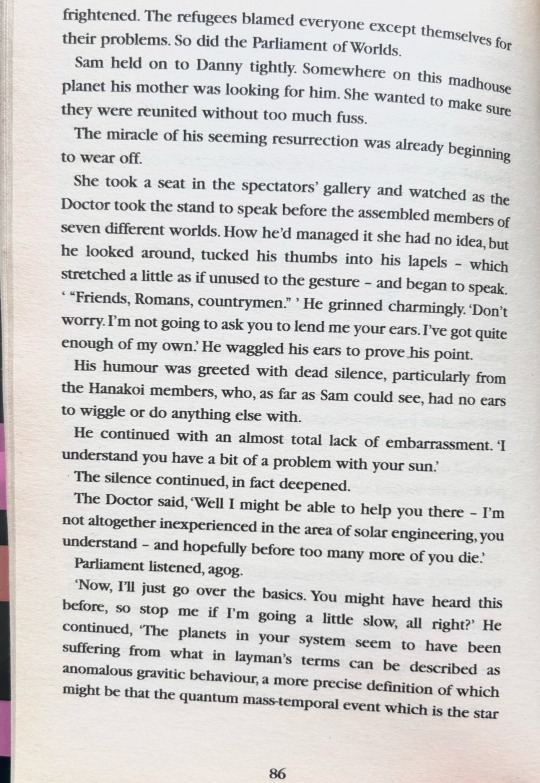
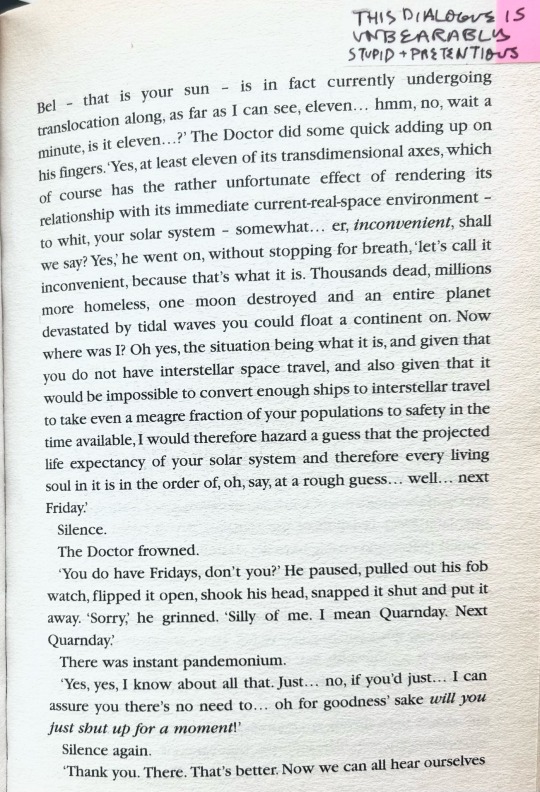
he’s like this from the very first scene (p.14):

i know the doctor is kind of a clown sometimes but this dude is a whole court jester, with bells on. it’s too much for me. he talks in amusing little circles, which might be interesting as a one-off in a much better novel, but becomes a dragging constant in this one. i also hate how he constantly talks down to people like a smartass caricature.
here’s some dialogue that i did enjoy, because it felt shockingly substantial (almost out of place), and expands on a scene from scarlet empress:

that was on page 93. the only part i really liked.
the plot orbits around the turbulent sun Bel as it begins to expand, scorching and destroying many of its 22 inhabited planets. ever since the peoples of Bellannia II, IV, XIII, etc. developed space travel, they’ve been dumping their radioactive and toxic waste onto a dead little world, which falls into the sun; little did the Bellannians know, a giant alien embryo was incubating in Bel’s warmth, and their pollution threatens to kill it. dun-dun-dun!
it’s kill the moon. it’s just 249-page kill the moon, but now with a melodramatic Rapture subplot.
right…. okay. just read this:

she ate 💅✨
anyway. millions if not billions of Bellannians are killed as the sun consumes or breaks apart their planets, and some of them turn to a traditional religion that encourages suicide (achieving an “Endless State” through eating poisoned wafers), but many of them are Actually Saved™️ by a little guy you might have heard of called…… Saketh.
the plot was kinda convoluted but essentially he was burned to death but came back, and now anyone who consumes his flesh will live forever (from what i gather, they die but they’re in suspended animation purgatorycore? and they’ll be brought back to life later? but the book ends abruptly and doesn’t explain much.)
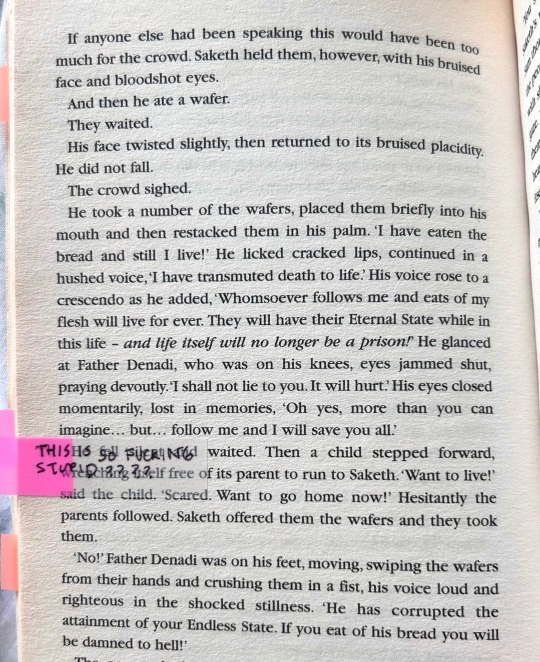
i obviously hated it. i really wanted to try to like it, but i couldn’t take it seriously. jim mortimore’s style feels purpley and theatrical, but instead of erring on the side of camp, it feels like it’s meant to be genuine religious/political commentary. it’s serious like how christian sonic fanart is serious. maybe i’m just not the right audience.
the intro might be one of the most interesting sections, given how personal and anthropological it feels: it tells two versions of the deaths of two brothers, who are among the last of their people. it was pretty good, i liked it. but not really the rest.
so yeah. overall, 1.5/10. this is in my bottom three worst EDAs so far. it’s a pretty harsh rating but i’m generous when my appreciation is earned :/
#it was wacky as all hell from start to finish#also he REALLY pushed the idea that sam wants kids which didn’t really feel consistent w her character. didn’t like that#doctor who#eighth doctor#sam jones#edas#undescribed
13 notes
·
View notes
Text
Personally, the times that I figure the Timeless Child into my Dr Who canon, I like to combine it with The Other from the VNA novels (even though I haven't read Lungbarrow yet).
The Timeless Child grows up to play a larger role in Time Lord politics, helping Rassilon and Omega establish their society and working for Division. Then they throw themself into the Looms, then ten million years later their influence creates a Time Lord with a more-or-less standard Time Lord biology. (Which kind of lets me have my cake and eat it too, with regards to the Doctor being a reincarnated victimised child an empire is built on AND a bog-standard citizen of the empire who learns to see its evils and run away.)
Combined with my 'Fugitive Doctor is between Two and Three' theory, that means my Dr Who Origins Timeline goes
The Timeless Child -> The Morbius Doctors -> The Other -> Loomstuff -> The First Two Doctors -> The Fugitive Doctor -> Exile, Etc.
#my posts#doctor who#canon wielding this franchise is ridiculous but someone has to do it#other#timeless child
28 notes
·
View notes
Text
Sometimes I’m like hm am I borrowing TOO much from doctor who for my comic…but then I feel like that fucking xkcd “it’s easy to forget that the average person only knows the big finish audios and maybe one or two VNA novels” because doctor who does not fucking use time sense in the show at all only in weird books from the 90s
#affirmations: dw does not own a vague concept they barely use#also mine is different#warlock wartalks#and I do want it to feel like. identifiable as a dw expy the same way omniman is a Superman expy#to like deconstruct and mess w tropes. but yk
12 notes
·
View notes
Text
Y'know, actually, about the Other, I find it really charming that for all the "Cartmel Masterplan's" lofty fandom reputation, it really is just:
1) the vague Doo Wee Woo across the s25 and s26 serials and the related Target novelizations (mostly Remembrance of the Daleks)
2) Aaronovitch and Platt's document
3) Platt's two VNAs (obviously)
4) Parkin's Cold Fusion taking the broad strokes and more doing its own very different thing
5) Steven Moffat hijacking Cornell's Human Nature to blatantly assert it's all just Peter Cushing.
12 notes
·
View notes